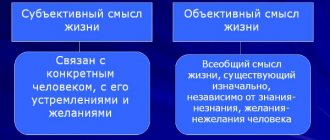They say wisdom comes with experience! So it turns out that the older a person gets, the wiser he is? To believe so is fundamentally wrong! In order to become wiser, you don’t have to sit and wait until you reach a certain age. After all, everything is in our hands, and you can begin to improve yourself, becoming wiser, without delay, right now.
But you should not confuse the two concepts - a wise person and an intelligent person. There is a line between these two criteria. A person may be well-read, know a lot of interesting facts from life, but he may not have enough life wisdom for achievements and accomplishments. It is she, wisdom, that helps us enjoy all the benefits life has given us.
Three steps
Usually in the human mind the words “stupid”, “smart”, “wise” are placed in a certain order - according to the degree of their significance for a person. These are stages of development where stupidity takes last place and wisdom is valued above all else. The following statements are floating around the world: “Good grades don’t mean anything” or “Smart in school is stupid in life.” And indeed it is. An educated person is not necessarily smart, and an intelligent person is not necessarily wise.
Before finding the differences between intelligence and wisdom, it is worth determining how an intelligent person differs from a stupid one.
Wise people use imagination
Although smart people may know a lot about the world, this knowledge can only be used up to a certain point. If we really want something, we need to imagine it in our imagination in the brightest colors. Only when we are specifically aware of what we desire will it become a reality.
As Einstein once said: “Imagination is more important than knowledge. For knowledge is limited to all that we know and understand, but imagination embraces the whole world, and all that our mind will ever know and understand.”
There is a stereotype that some people are born wise, or that only older people can be wise. However, research shows that wisdom is something that can be developed.
Luckily, we can make an effort to learn things and experience new things with an open mind. We can also try to perceive negative situations differently. This will help us become stronger.
Simple steps such as deep perception, meditation and using our imagination help us become wiser. And wisdom gives us the opportunity to enjoy everything that life gives and share it with others.
Who's smart here?
Note. A smart person can be distinguished from a stupid person by certain signs.
- An intelligent person is able to change his point of view because he questions everything. He is open to gaining new knowledge and development. Whereas it is useless to argue with a stupid person.
- Smart people study a situation thoroughly before drawing conclusions.
- They have a good sense of humor. Their jokes are not superficial, but have a deep meaning.
- For smart people, a mistake is a failed attempt. They learn from their mistakes and try not to make the same mistakes.
- An intelligent person has an appropriate environment - he communicates with his peers, because this allows him to develop. Moreover, he communicates with a purpose without wasting his time.
As they say, it is better to be smart and stupid than to be stupid and smart. Having intelligence does not always save a person from stupidity, because it is human nature to sometimes be guided by emotions and feelings. And sometimes act out of habit. So a person can make mistakes simply because he is not used to “turning on” his mind when needed. Not everyone likes to think. You also need to learn this and train yourself in this.
However, besides the mind, there is something more mysterious, and that is wisdom.
Today in the magazine MORE we will look at 9 main principles that a wise person follows in life
It turns out that becoming wise is not so difficult. And all these principles are as simple as daylight. The main thing is to learn to stick to them and not stray from the intended path.
But a wise man will never:
- allowing others to ruin your mood;
- forget old grievances;
- overestimate your strength;
- chasing an unattainable goal;
- live in the past with its failures and mistakes;
- obsess over problems;
- communicate with losers and pessimists;
- keep evil inside;
- agree to everything to your detriment.
We are always fascinated by people who know how to maintain balance (and we are not talking about sports now), who are resistant to negative environmental factors, who know how to show composure when necessary and do not lose their composure. How do they manage to do this? How do they manage to control themselves? Did nature reward them with such qualities, or were they able to cultivate them in themselves, develop and improve them to the required level through some specific training? What's the secret?
And the secret, as we have already said, is in the principles of life, which must be strictly adhered to and which must be followed in the desire to become wiser.
Let us dwell in more detail on each of these points of the rule of a wise man:
1) Don't let anyone ruin your mood
If the opinions of others and their success in business determine your mood, then, unfortunately, you still need to learn wisdom. You need to work on your self-esteem. People with high self-esteem are not bothered by the successes of others, they do not compare themselves with anyone, they do not look up to anyone. Their own successes are important to them, they are pleased with their own successes, and they don’t care about others.
A wise person strives to become the best version of himself without being like anyone else!
2) You can forgive, but not forget
photo:
A wise person knows how to forgive past grievances. He does not hold a grudge against his offenders, but this does not mean at all that he has forgotten everything and let the situation go. By analyzing the situation, a wise person will draw certain conclusions, gain experience and knowledge that will help him decide on his further actions towards the offender.
A wise person, knowing in advance what can await him in a relationship with such a person, will already be prepared and will be able, if necessary, to protect himself from such an unpleasant person.
3) Overestimate yourself and your capabilities
Self-confidence is, of course, good, but sometimes it wouldn’t hurt to evaluate the current situation and how life-threatening it is. If we take any conflict situation as an example, then at any moment emotions can take over and prevent the right decision from being made. And in a fit of anger, rage and anger, you can chop a lot of firewood.
Therefore, you are required not only to assess the complexity of the task placed on your shoulders, to calculate your strength, but also to learn to keep your emotions under control.
4) In pursuit of the ideal
photo:
Striving for perfection is good. But there is nothing ideal in our life, and, as a rule, an ideal is something unattainable - a dream, a desire, a goal. And in pursuit of the ideal, we can waste a lot of energy and effort without achieving anything. Therefore, instead of sand castles, it is better to set yourself more achievable goals and specific tasks.
As they say, a bird in the hand is better than a pie in the sky. And instead of abstract goals, concrete ones are better. And ideals, by the way, tend to quickly depreciate.
5) Live by past failures
Everyone makes mistakes. And someone can score more than one bump until they achieve what they want. Everyone faces difficulties and failures along the way. But they should not confuse you in any way. On the contrary, difficulties strengthen us and only make us stronger and more resilient.
We learn from mistakes and failures, and using past experiences as an example, we turn all our failures, defeats and failures into successes.
6) Focus on problems
Some, when faced with a problem, simply give up and begin to obsess over it. This only increases self-doubt and self-confidence. Negative thoughts in your head do not give you peace and the opportunity to switch, to start looking for a way out of the situation. This only escalates, and the situation gets worse, preventing you from moving on and trying to change something for the better. This is the wrong tactic.
You shouldn’t constantly think about the problem, but you need to look for ways to solve it and get rid of it.
7) Dealing with whiners and weaklings
photo:
Having driven away all bad thoughts about failures, drive away people who think only about bad things. A pessimistic attitude in life only depresses you. Their melancholy rubs off on you. These people live under constant stress. Is this what you're missing in your life? Because when communicating with such “whiners,” you unwittingly transfer their situations into your life. To prevent this, simply protect yourself from such people.
Or there is another option for solving the problem: help this person get out of the shackles of failure and see the light at the end of the tunnel, teaching the person not to focus on the problem, but to look for ways to solve it.
 Keep evil inside
Keep evil inside
It’s the same as multiplying negativity, poisoning your own health. The destructive power of evil does not give you the opportunity to develop, experience positive emotions and strive for fundamental changes.
If you constantly focus on the evil that has brought and continues to bring you nothing but suffering, you will not be able to draw any conclusions and try to change the situation for the better.
9) Stop agreeing with everything
Sometimes it doesn’t hurt to be able to say “No!” To do this, you need to clearly set life priorities, be aware of your true desires, not imposed from the outside. Learn to first achieve harmony with yourself. This will make it easier for you to refuse to another person what you do not want to do, something that will not bring you any pleasure or benefit.
Parable
Parables were written about everything. They answered no matter what questions. The question of how a wise person differs from a smart person is answered in parables extremely rarely, but it still happens. Below is an example.
Once upon a time Knowledge, Cunning and Intelligence met. Knowledge and Cunning began to argue which of them was more important. The mind stayed away in order to maintain good relations with them and subsequently use both. But the dispute flared up, and they persistently began to pester Umu so that he would make a judgment as to which of them was more important. The mind decided to shift this responsibility onto the Wise. Because he was an authority for him too. Wise was Uma's uncle, although they did not communicate often. And so the three of them went to the Wise One and knocked on the door. His wife, Conscience, revealed it to them. It turned out that the Wise One was not at home. Conscience told me that this does not happen often, and few now consult with the Wise. When Intelligence, Knowledge and Cunning returned, Intelligence told them: “You see, no one needs the Wise One with his truth, so be happy with what you have.”
From the parable it is clear that a smart person has a lot of knowledge and cunning. Although a person who knows a lot is not always smart. Perhaps the person just has a good memory. Wisdom is close to conscience and is the head of everything. The parable clearly shows the difference between a wise person and a smart person. The first is necessarily associated with good (he helps people, his wife is Conscience), the second is not always (his friends are Cunning and Knowledge, he acts in such a way as to benefit).
Types of intelligence
There are two types of intelligence - verbal and non-verbal. Most often, a person develops a specific type. However, it happens that both types develop in parallel. Then the person’s personality will be completely harmonious.
Verbal intelligence . This type of intelligence refers to a person’s ability to think while speaking. He can think through further steps in the conversation without being distracted from the dialogue;
Nonverbal intelligence is the ability to skillfully operate with images in one’s own mind. This type of thinking is possessed mainly by creative individuals.
A person, in the course of his life, develops both types of thinking. It all depends on age. For example, the level of development of verbal thinking in a child will be lower than in an adult. However, the child has more developed non-verbal thinking.
The meaning of the word "wisdom"
Wisdom cannot be precisely defined. It is often associated with experience and with old age, with emotional balance and the ability to make decisions in difficult situations so that everyone is happy.
Wisdom is a certain balance between strength and weakness, confidence and doubt, severity and gentleness, one’s own interests and the interests of others. She is harmonious.
No one will call an evil smart person wise. Perhaps they will call him cunning. Perhaps a genius, but not wise. Because the adjective “wise” is exclusively positive. So what is the difference between a wise person and an intelligent person? Below are the main signs.
Pursuing positive and constructive goals
From time immemorial, wise people have pursued exclusively creative goals. Tsars, kings and other rulers, famous for their wisdom, tried by any means to improve the well-being of their citizens. If the monarch was not creative, then the people would soon overthrow him from the throne. In our time, the situation has not changed. Wise people pursue global goals that allow them to sow goodness in the world. For example, if a truly wise person works in an office, then he will first of all think not about increasing earnings, but about improving the atmosphere among the team.
How to acquire wisdom
Almost every person sometimes shows wisdom. If you ask a person to remember where he acted wisely, he will definitely find such a situation. And what happens sometimes can happen more often over time.
To learn to balance between severity and gentleness, your own interests and those of others, to look at the situation from different sides, you can develop the habit of looking at yourself as if from above (from space or from heaven), thus abstracting from your feelings. You can also think of yourself in the third person, as some kind of Dasha or some kind of Petya. This works because it is easier for a person to judge wisely about someone else's life than about his own.
The main thing is to move in this direction, then both wisdom and love will come. And life may become easier.
Wise people develop using crisis
It often happens that negative experiences have the best effect on a person's wisdom. This is why people who have experienced psychological trauma seem especially wise. Research confirms this: people who endure adversity become stronger as a result.
Most of us have had some negative experience in life that has forced us to rethink important things. However, we do not have to experience a crisis to become wise.
We can improve our wisdom by learning from events every day. We can choose how to respond to negative situations, and making the right choices in a difficult situation can help us become wiser.











